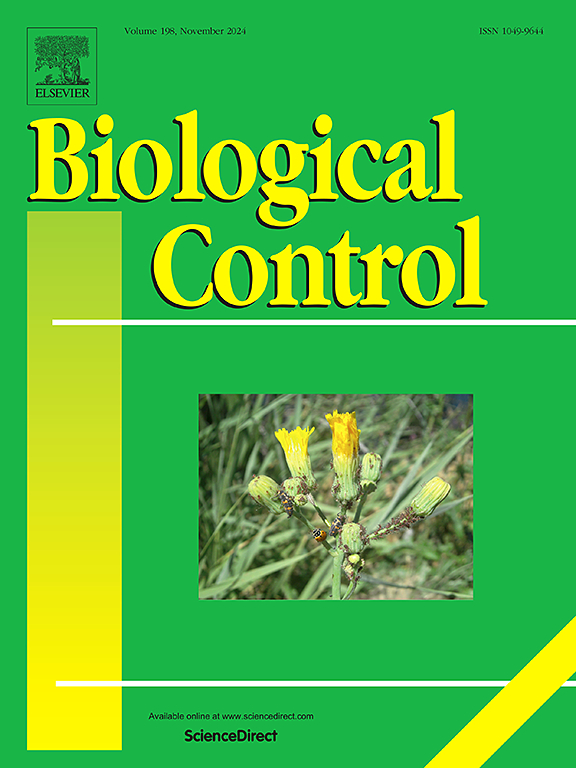Reduced-risk insecticides can effectively manage thrips without compromising Orius predation in pepper production
IF 3.4
2区 农林科学
Q2 BIOTECHNOLOGY & APPLIED MICROBIOLOGY
引用次数: 0
Abstract
The western flower thrips (WFT), Frankliniella occidentalis (Pergande) is a key pest in fruiting vegetables worldwide, causing significant yield losses in peppers via feeding on leaves, flowers and fruits. While pepper growers rely heavily on insecticides for WFT management, some insecticide products may compromise natural enemies, like minute pirate bugs (Orius spp., Hemiptera: Anthocoridae), crucial predators of thrips. To assess the performance of insecticides in bell pepper production, we conducted field trials and laboratory bioassays. Field trials were conducted to assess the impact of six insecticides (isocycloseram, cyantraniliprole, spinetoram, spirotetramat, λ-cyhalothrin and imidacloprid) on densities of WFT and Orius and yield. In a follow-up bioassay, we exposed minute pirate bugs (Orius insidiosus (Say)), to insecticide residues and measured their mortality and predation of WFT. Results indicate that broad-spectrum insecticides significantly reduced field Orius populations by up to 80 %, while reduced-risk insecticides like cyantraniliprole and spirotetramat had minimal impact. Furthermore, while insecticide management contributed to WFT suppression, its impact on yield was minimal, indicating that factors beyond WFT management may play a more significant role in determining productivity in pepper production systems. Laboratory insecticide residual bioassays further demonstrated that exposure to broad-spectrum insecticide residues significantly increased mortality of O. insidiosus and decreased predation of WFT. In contrast, the residues of selective insecticides did not significantly impact mortality and overall predation of WFT. These findings support the use of cyantraniliprole, spirotetramat and spinetoram as effective insecticides in sustainable pest management programs that effectively reduce WFT while preserving Orius populations and their predatory function.
降低风险的杀虫剂可以有效地管理蓟马,而不影响花椒生产中稻瘟虫的捕食
西部花蓟马(WFT), Frankliniella occidentalis (Pergande)是世界范围内水果蔬菜的主要害虫,通过捕食叶片,花朵和果实造成辣椒产量的重大损失。虽然胡椒种植者严重依赖杀虫剂进行WFT管理,但一些杀虫剂产品可能会损害天敌,如微小的海盗虫(Orius spp.,半翅目:蚁科),这是蓟马的主要捕食者。为了评估杀虫剂在甜椒生产中的应用效果,我们进行了田间试验和实验室生物测定。通过田间试验,评价了异环虫胺、氰虫胺、刺虫胺、螺虫胺、高效氯氰菊酯和吡虫啉6种杀虫剂对稻螟和稻螟密度及产量的影响。在后续的生物测定中,我们将微小的海盗虫(Orius insidiosus)暴露于杀虫剂残留物中,并测量了它们的死亡率和WFT的捕食率。结果表明,广谱杀虫剂可显著减少田间玉米螟种群数量达80%,而低风险杀虫剂如氰虫虫和螺虫的影响最小。此外,虽然杀虫剂管理有助于抑制WFT,但其对产量的影响很小,这表明WFT管理之外的因素可能在决定辣椒生产系统的生产力方面发挥更重要的作用。室内杀虫剂残留生物测定进一步表明,暴露于广谱杀虫剂残留显著增加了杀虫死亡率,并减少了白腹腹虫的捕食。相比之下,选择性杀虫剂的残留对白蛉的死亡率和总体捕食率没有显著影响。这些发现支持在可持续虫害管理计划中使用氰氨虫、螺虫和spinetoram作为有效的杀虫剂,有效地减少WFT,同时保护大耳螟种群及其捕食功能。
本文章由计算机程序翻译,如有差异,请以英文原文为准。
求助全文
约1分钟内获得全文
求助全文
来源期刊

Biological Control
生物-昆虫学
CiteScore
7.40
自引率
7.10%
发文量
220
审稿时长
63 days
期刊介绍:
Biological control is an environmentally sound and effective means of reducing or mitigating pests and pest effects through the use of natural enemies. The aim of Biological Control is to promote this science and technology through publication of original research articles and reviews of research and theory. The journal devotes a section to reports on biotechnologies dealing with the elucidation and use of genes or gene products for the enhancement of biological control agents.
The journal encompasses biological control of viral, microbial, nematode, insect, mite, weed, and vertebrate pests in agriculture, aquatic, forest, natural resource, stored product, and urban environments. Biological control of arthropod pests of human and domestic animals is also included. Ecological, molecular, and biotechnological approaches to the understanding of biological control are welcome.
 求助内容:
求助内容: 应助结果提醒方式:
应助结果提醒方式:


